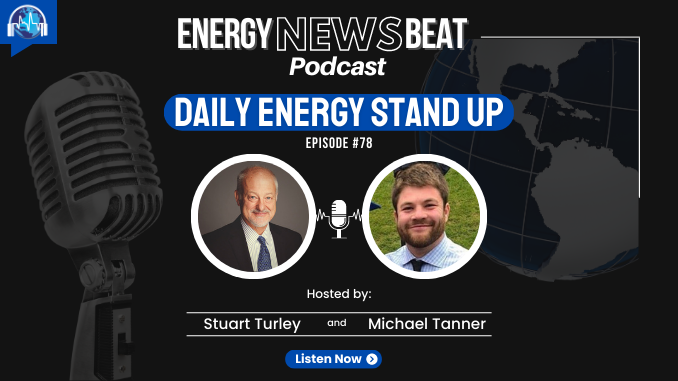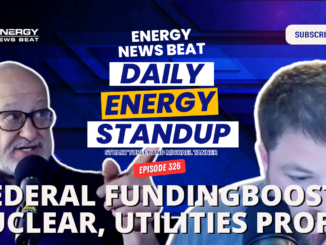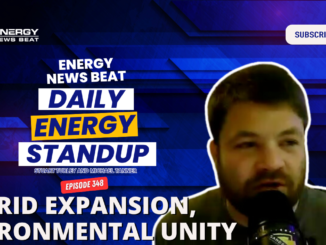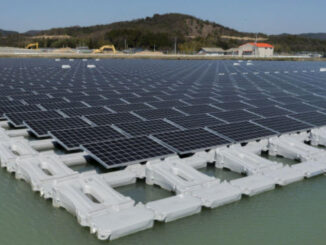
Top Stories of the week
Forget Peak Oil Demand: A Thirst for Barrels Puts $100 in View
Opinion: BP’s Beyond Petroleum rolls back climate ambitions, sends …
The Inflation Reduction Act Is Very Good At One Thing: Making Billionaires Richer
Oxy CEO Vicki Hollub doesn’t seem worried about White House pressure on buybacks, oil prices
Small Modular Nuclear Reactors May Become The Go-To Energy Source
Highlights of the Podcast
00:00 – Intro
00:57 – Forget peak oil, demand a thirst for barrels puts $100 a barrel on view
06:30 – BP’s Beyond Petroleum rolls back climate ambitions
10:14 – Inflation Reduction Act is very good at one make it one thing making billionaires
13:48 – Oxy CEO, Vicki Hollub does not doesn’t seem to be worried about White House pressures on buybacks and oil prices
16:28 – Small modular nuclear reactors may be the go to energy source
18:57 – Outro
Follow Stuart On LinkedIn and Twitter
Follow Michael On LinkedIn and Twitter
Video Transcription edited for grammar. We disavow any errors unless they make us look better or smarter.
Michael Tanner: [00:00:14] What’s going on. Everybody, Welcome into a special edition of the Daily Energy News Beat Stand Up here on this gorgeous Friday, March 10th, 2023. We have, as I mentioned, a special show. We are going to run back and play you our top segments from this week. [00:00:27][13.4]
Michael Tanner: [00:00:27] It was a crazy week, Stu. We had a lot of stuff happen, so it was back. Stay tuned. Again, all of the info you are about to hear is courtesy of the world’s greatest website, energy news beat.com. Check us out here. The description below. We will see folks on Monday. Enjoy the show. [00:00:43][15.9]
Stuart Turley: [00:00:44] Hey, let’s go ahead and start with the one that I’m a little confused on as far as everybody is jumping up and down and saying China’s demand is going to change world oil. This article is forget peak oil, demand a thirst for barrels puts $100, $100 a barrel on view. [00:01:03][19.1]
Stuart Turley: [00:01:04] Now remember, that’s Brant, not WTI. And so, Michael, I think that it’s really the demand is going to be there. But a minister CEO of Saudi Aramco says the demand from China is very strong, but I don’t think it’s going to drive it to the $100. [00:01:23][19.3]
Stuart Turley: [00:01:24] I think I like the way that he is positioning this. My view shorthand is maybe people are underestimating, demand is overestimating. U.S. production. Chief economist at Trader Rig Group,. [00:01:41][16.8]
Michael Tanner: [00:01:42] Trafigura. [00:01:42][0.0]
Stuart Turley: [00:01:43] Trafigura. Thank you. Bless you. And I. I don’t know what are your thoughts? [00:01:48][5.4]
Michael Tanner: [00:01:49] Oh, but yes, it’s true. Figure is one of the largest like physical oil and metals traders in the world. There’s a great book called The World is a for Sale by Javier Baez and Jack Barg. Great, great book, which covers the history of Rich Inco Trafigura Vitol, all of the big oil and metals metal traders. [00:02:10][21.1]
Michael Tanner: [00:02:11] So it is kind of funny, though, You know, they get this chief economist at Trafigura. In my view, shorthand is maybe people are underestimating demand and overestimating US production. Bro, you get paid to be bullish. Your literal job is to convince the world that we should buy more oil and that they should buy it from you. [00:02:26][15.8]
Michael Tanner: [00:02:27] So I’m going to change anything. Saeed Rahim I’m sure he’s brilliant, but he’s literally is paid to be bullish. So that’s it’s a backhanded way of saying, yes, he’s probably going see that. I mean, on the Brant side, here’s this You can make an art, you can make an argument for both. [00:02:42][15.1]
Michael Tanner: [00:02:42] I think there is a set of facts that when you look at them, you can come to the conclusion of, Oh wow, yeah, we probably are underestimating what China’s China’s demand is going to do once they come back and start really ramping up their needs. [00:02:56][13.2]
Michael Tanner: [00:02:56] What’s that going to do? And I think they point out specifically the US production, that’s a very valid point. And we’ve seen this there are all sorts of studies that you can go find and we’ll link a couple in the descriptions below of and I’ll send them to our team so they can make sure they link it. [00:03:14][17.5]
Michael Tanner: [00:03:14] Showing that outside of the Permian Basin oil overall, oil and gas production has declined. New oil and gas wells are coming on not as productive as they used to. [00:03:24][10.1]
Stuart Turley: [00:03:25] Right. [00:03:25][0.0]
Michael Tanner: [00:03:25] We’re running out of really, really good Tier one acreage. Where is the growth going to come from in the U.S. market to keep up with what will be regardless of where you fall on the bullish versus bear side, we do know demand will grow. [00:03:39][14.5]
Michael Tanner: [00:03:40] The question is how much? And if China accounts for more than we expect and we see a higher demand spike than we expect, things could get tight. I tend to agree with the facts on the other side that say things are pretty balanced right now and already at a pretty inflated level. [00:03:56][16.7]
Michael Tanner: [00:03:57] I mean, as we sit now, WTI is $79, basically $80. Brant is at 8674. [00:04:02][5.1]
Stuart Turley: [00:04:04] Right. [00:04:04][0.0]
Michael Tanner: [00:04:04] Is there a $14 on Brant room to run north? Is there is that much excess demand? Is there that much sentiment on the demand side coming from China? I don’t know. I don’t know. [00:04:16][11.4]
Michael Tanner: [00:04:16] And I do know that there are lots of oil projects coming online in the Gulf of Mexico. Think about $100 oil is a huge, huge spurn for these large integrated oil companies. They go out and really where the needle moves is that Gulf of Mexico production. [00:04:30][14.3]
Michael Tanner: [00:04:31] But you have to think about these are six month projects so you turn a well, you go start drilling a pad in Gulf of Mexico in July of 2021 when that or 2022 and that project gets greenlit at $110 oil. You’re not seeing production on that for six months, eight months because of the entire book. [00:04:46][14.9]
Michael Tanner: [00:04:46] You’re probably just starting to flow back some of these bad boys and just now starting to realize and see some of that real uptick in production. [00:04:53][6.5]
Michael Tanner: [00:04:53] So I’m a little bit mixed on this analysis. I mean, you know, obviously, Trafigura is going to agree, I am going to say, but I mean, me, I would do the same thing if you were paying me as much money as this guy is getting paid. [00:05:05][12.1]
Stuart Turley: [00:05:05] And pay us. Let’s find out. [00:05:07][1.1]
Michael Tanner: [00:05:07] Cheap. [00:05:07][0.0]
Stuart Turley: [00:05:08] Yeah, we are cheap, but better looking. I bet. Hey, here’s. Yeah, well, maybe I haven’t looked in the mirror lately. Hey. One of the. One of the things, though, that really concerns me, my hesitancy to put a number on China is out there right now and saying, hey, it’s going to impact us this much. [00:05:26][18.0]
Stuart Turley: [00:05:26] OPIC just came out and said that they’re really they’re really not sure there are over 30 tankers a month right now that are going to the dark in the gray fleet. So that is something that opaque in that everyone else is really not considering, is Russian and Iranian and Venezuela inputs to China and India. Everybody is saying those demands are going up. How much oil is going to be supplied by the Dark Fleet? That to me tells me that OPEC is more afraid of that. And in trying to figure out pricing, I have no clue on how to figure out the pricing anymore. But that dark fleet is going to be substantial. [00:06:14][47.5]
Michael Tanner: [00:06:15] I’m not surprised that you gravitate towards the Dark Fleet. [00:06:18][3.7]
Stuart Turley: [00:06:21] Yeah, me and Luke Skywalker, we know how to find that dark side. Okay, next article. Dude, this is pretty funny. This is an opinion piece. And BP’s Beyond Petroleum rolls back climate ambitions. It sends a different kind of message, Michael. Now, we’ve been talking about this for several weeks now, but I like this one because it really fit in with our other stories as well, too. BP drank the Kool-Aid. I mean, if they were in, you know, was where was the thing where everybody was drinking the Kool-Aid and got killed? [00:06:57][36.4]
Michael Tanner: [00:06:58] Oh, James, down in Cuba was Jim Jones, Jim. [00:07:02][4.3]
Stuart Turley: [00:07:03] Jones and Jamestown or whatever. [00:07:04][1.4]
Michael Tanner: [00:07:04] Yes, Jamestown. [00:07:05][0.4]
Stuart Turley: [00:07:06] Yeah. So anyway, they all drank the Kool-Aid, the religion there. And here’s here’s what the problem is. They went Chevron stayed the course. They were the poster child, as you know, really holding on tight. [00:07:22][16.0]
Stuart Turley: [00:07:22] Then you take a look at, you know, it’s the fringe total energy you know, that’s the Oklahoma way to talk. You know, they said, don’t give me that. You know, I get man, I can’t handle it. I’m just, you know, both of our fans just threw up. [00:07:39][16.7]
Stuart Turley: [00:07:39] But when we sit back and take Total is now actually increasing their drilling programs, they’re they’re going, well, you know, if BP can do it, we can do it as well, too. They just announced an increase in their drilling. [00:07:54][14.2]
Stuart Turley: [00:07:55] Shell is doing the same thing they are now rolling back. And this goes back to when you and I were talking a little while ago about the CEOs in front of Congress and they stood up to Congress go US big oil CEOs. I’m proud of them. [00:08:12][17.5]
Michael Tanner: [00:08:13] I think there’s a really important quote at the bottom of this, and I’d recommend reading this whole article again, you can click the description and see and check this article out. One of the final senses, the big oil companies figured this out years ago and generally avoid tech based climate solutions. [00:08:26][13.2]
Michael Tanner: [00:08:26] Why? Because they know how to drill for oil and gas. You start getting into these other business models. It’s tough. I mean, I was just I just listened to a podcast with the former CEO of IBM, Gina. What’s her last name property or whatever. [00:08:38][11.9]
Michael Tanner: [00:08:39] She was the CEO of IBM from 2012 to 2020, a period where they had to completely shift their business model from,. [00:08:46][7.0]
Stuart Turley: [00:08:46] Oh yeah,. [00:08:46][0.1]
Michael Tanner: [00:08:47] Physical infrastructure to now cloud based. It’s not easy. It’s not hard. And one of the few reasons companies are companies able to do that is slow change in progress and all this stuff. It doesn’t happen overnight. [00:08:59][12.1]
Michael Tanner: [00:08:59] BP decided two years ago they want to be a wind farm company you want to be a wind farm company? Cool. It’s going to take multiple decades in order to completely roll out and really rebuild a business. I mean, because they’re two different business models. Not to get on a total side rant here,. [00:09:15][15.2]
Michael Tanner: [00:09:15] But there’s they’re used to you know, I you know, three, four years ago and and and right when I was getting into grad school, one of the projects they had me work on was, oh, we need to try to build education programs to take people who work in oil and gas and train them to work in renewables. [00:09:28][13.3]
Michael Tanner: [00:09:29] And what you realize real quickly is there no transferable skills. The only trans fills that are skills that are transferable or transferable to all other industries, project management experience, understanding how to hit deadlines, budgeting. [00:09:40][11.4]
Michael Tanner: [00:09:40] But that goes to any deal, not just what a wind farm looks like. Everything else about understanding and building, like I would say, exclusive, like an offshore wind development has very little to do with it. [00:09:51][10.3]
Michael Tanner: [00:09:51] You need a structural engineer out there you know, petroleum engineer is designing how an offshore wind should shoot. We’re not qualified for that. So side rant the idea that you can just pivot your whole, Oh, we’ve got smart people here. We’re going to teach them through our offshore wind farm is ludicrous. [00:10:06][14.8]
Stuart Turley: [00:10:07] Yes. No. Now, that would be hideous. But, you know. Hats off to the US Big Oil Inflation Reduction Act is very good at one make it one thing making billionaires richer. For our podcast listeners, the article has a picture of I believe, Captain Kangaroo’s son. [00:10:28][21.2]
Stuart Turley: [00:10:29] If you don’t know who Captain Kangaroo is, this kid looks just like Captain Kangaroo. But anyway, fair haired Fred Abramson, 84, he’d be about the right age for Captain Kangaroo son instead denver based software entrepreneur made his initial fortune in 1990 as publishing software quarkxpress. But he’s then had another investment in branding he made west Virginia Senator Joe Manchin for his recent good fortune. The Inflation Reduction Act. [00:11:04][34.6]
Stuart Turley: [00:11:04] And I believe that Dan Bonjean, he calls it the Porkulus bill is actually correct. These are about the solar panels. Even before the bill, First Solar had a backlog which is now ballooned to more than 16 gigawatts. That means billions in tax credits for First Solar and ample incentive to build more factories in Ohio, Indiana and India. [00:11:31][27.4]
Stuart Turley: [00:11:32] Osborne thinks that the company can deliver these expectations. Earnings could grow to $24 a share by 2026. The number one problem with the Inflation Reduction Act. It has zero ability to to reduce the inflation. It’s going to put all of the money into renewable pork and it’s going to be driving a lot of foreign countries coming in to tap into that money. [00:12:06][33.4]
Stuart Turley: [00:12:07] So he is a perfect example of a investor that his solar investment is worth $1 billion and is growing even more. So investors investing in solar are good. The rich get richer and the poor get the bill on their energy bill. [00:12:28][21.8]
Michael Tanner: [00:12:29] Yeah, I mean, it it comes as no surprise that when you hand out, you know, billions of dollars of subsidies that the rich who run the companies are going to just basically be able to swoop in and basically take all this. [00:12:40][11.2]
Michael Tanner: [00:12:41] So that doesn’t come as a shock to me. I do agree with by Joe’s analysis, this thing is full of a lot of pork. So to be again, that we know how it’s getting doled out, if you’re in the renewable space, you’re going to have your hand out, you know, and the it’s going to be interesting to see how all of this plays out Stu. again, I’m not an expert. I’m not a political expert, so I don’t want to pontificate on how you go about fixing this other than there’s no reason to even pass this bill in the first place. Well. [00:13:07][26.2]
Stuart Turley: [00:13:07] The one thing that I do am taking offense to is people saying that an article yesterday came out on Sunday or the day before and said $16 billion of subsidies were given back to oil and gas investors. That is not true. Stock buyback programs are going money that they’ve earned going back to investors. That’s not subsidies, but the other folks are calling those subsidies. So let’s get the word subsidy right. [00:13:43][36.0]
Stuart Turley: [00:13:44] Okay. Let’s get through that. And let’s go to my favorite Oxy CEO, Vicki Hollub does not doesn’t seem to be worried about White House pressures on buybacks and oil prices. I love you know, I absolutely think the world of Vicki, she we talked about this yesterday. She took the holistic approach of, hey, I’m going to be an oil person,. [00:14:08][23.8]
Stuart Turley: [00:14:09] But I’m going to tap into the carbon capture game, which is a multitrillion dollar market. And she was the top player in the fortune in the S&P 500 last year. That’s not bad. You’re out of town. You’re not. [00:14:24][14.8]
Michael Tanner: [00:14:24] At all. Not at all. I think it’s and I think another interesting thing to point out is the fact that Oxy, they took a different approach to the ESG game, whereas the super majors, you know, you could consider Oxy as a supermajor or not. They’re not Nessus. They don’t they’re not necessarily fully integrated downstream. But I mean, they do have Oxy cam, you know, they do have a little bit of a midstream interest, so they do a little bit. [00:14:46][21.8]
Michael Tanner: [00:14:46] They, unlike their peers, BP and Equinor and Total, instead of investing in wind and solar projects, they went to what you said, the carbon capture market much more contiguous or analogous with the oil and gas business then is trying to build offshore wind farms, which is a whole new business, like it’s literally relearning how to do everything. [00:15:09][22.7]
Michael Tanner: [00:15:10] So. It’s really smart. There’s a reason they were the number one performing stock both in the S&P and just an oil and gas for that reason. And I think they were the best performing oil and gas stock because they have really good rock. They have really good acreage in West Texas. They have really good Colorado acreage, very close with the Colorado team up there. They’ve very good returns on that. [00:15:29][19.0]
Michael Tanner: [00:15:29] I know it’s been lightly marketed a few times and they haven’t come close to seeing anything in which would come a decent offer for that acreage. I mean, it’s a very healthy cut to their bottom line, but they’re also the way they’ve been number one. [00:15:42][13.1]
Michael Tanner: [00:15:42] That’s why they’ve been number one in the oil and gas space. In terms of returns in the overall markets, obviously, oil and gas has done really well. But you add on top of that, investors see them as both green quote unquote, and having actual sound fundamentals with oil. [00:15:57][14.7]
Michael Tanner: [00:15:57] So I think it’s great. There’s a reason Warren Buffett invested in them. He’s made a boatload of this good for him. [00:16:02][4.9]
Stuart Turley: [00:16:02] And they had 12, 12% production growth last year. Michael, that’s even with giving their money back and everything else. So if you take a. [00:16:11][9.1]
Michael Tanner: [00:16:12] Crazy. [00:16:12][0.0]
Stuart Turley: [00:16:12] 12% production growth with a lower CapEx, holy smokes, that’s. [00:16:19][6.1]
Michael Tanner: [00:16:19] They’re drilling they’re drilling four mile laterals up in Colorado. [00:16:22][2.9]
Stuart Turley: [00:16:23] Wow. That’s town. That’s talent right there. Small modular nuclear reactors may be the go to energy source. And Michael, this article is really important from the standpoint that by the time you get a real, real big reactor, it’s 20 years to get approved. [00:16:42][19.6]
Stuart Turley: [00:16:43] The smaller ones are coming around the corner and they’re going to be able to be made in a production line. And that way you’re able to use these and drop them off simply must have some form of baseload. I’m reading from Jeff Mary Field. [00:17:01][18.5]
Stuart Turley: [00:17:02] You simply must have some form of reliable baseload power because you can’t get there with these assets that operate part of the time, like wind or solar, says Jeff Mary, Field, partner at Pillsbury, Winthrop Shaw and Pittman, a former nuclear regulatory commissioner. [00:17:18][16.4]
Stuart Turley: [00:17:19] Nuclear power plant is more costly upfront, but it has assets that operate for over 80 years. If you compare it to wind and solar, they generally have a 20 year lifetime in batteries for about a And I think if you divide that number by two, you’re actually closer to right. [00:17:35][16.2]
Stuart Turley: [00:17:35] They generally have a ten year and four years but we’ll leave that alone Anyway. This goes with that other article of energy security. We need small nuclear for baseline. Anyway, your. [00:17:46][10.9]
Michael Tanner: [00:17:47] Thought. I mean nuclear I in theory and probably on paper, even though you could argue, is probably the best for baseload energy supply, which is critical to sustaining growth in a emerging market or keeping the quality of life wherever you live. [00:18:01][14.9]
Stuart Turley: [00:18:02] Right. [00:18:02][0.0]
Michael Tanner: [00:18:02] Now, Am I in favor of just trying to make modular nukes and everyone’s walking around with a, you know, fat boy and little John in their trunk? I mean, I’m I don’t know if that’s quite the conversation I’m willing to have yet. I mean, can you imagine you just. Oh, just, you know, you pull out your laptop and there’s just a little nuke in there because it’s power in your laptop. I mean, right now. [00:18:23][21.2]
Stuart Turley: [00:18:24] You’re watching too many Marvel things when you got Iron Man rolling around with it. [00:18:29][5.3]
Michael Tanner: [00:18:29] Exactly. But that’s what everybody jumps to. That’s my point. Everybody jumps. Do modular nukes like they’re going to be in my car. [00:18:35][6.0]
Stuart Turley: [00:18:36] Now, modular nukes at this particular point are going to be the size of a semi or they’re going to be sized at two or three semis. You know, it’s going to be the same size that power ships. [00:18:36][0.0]



